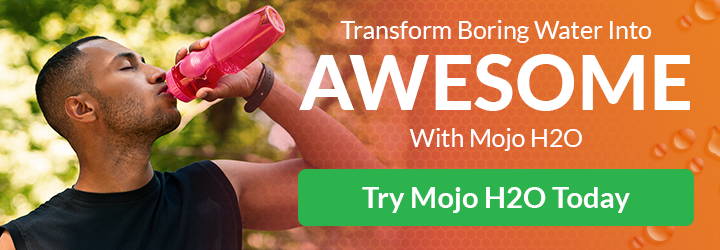How to Tell If You’re Dehydrated (11 Warning Signs)

Have you been drinking enough water? Anytime I find myself with a headache, cramp, or just feeling a little bit off, this is the first question I ask because chances are good that the answer is no, and I’m dehydrated.
Maintaining proper hydration is fundamental to keeping the body functioning optimally. And for many of us, prioritizing drinking enough water throughout the day is a habit that has become buried beneath the growing pile of health-conscious rituals being squeezed into our daily routines. Despite knowing the importance of hydration, this has led us to finding our bodies lacking enough water and leading to symptoms of dehydration.
What is Dehydration?
“Dehydration occurs when you use or lose more fluid than you take in, and your body doesn’t have enough water and other fluids to carry out its normal functions,” according to medical experts like the Mayo Clinic.
Several factors, such as sweating too much on a hot day or exercising a lot, can cause you to lose water quickly, allowing dehydration to sneak up on you. If lost fluids are not replaced, dehydration can occur at varying degrees, such as mild, moderate, or severe.
Severe dehydration requires medical attention and can lead to health complications. Fortunately, before reaching the upper limits of severe dehydration, there are several indications on how to tell if you’re dehydrated.
How to Tell If You’re Dehydrated: 11 Warning Signs
1. Fatigue
Add dehydration to the list of the many things that can lead to feeling tired. Studies have shown that dehydration can lead to fatigue, lethargy, and tiredness due to low blood pressure. 1
2. Headaches
Headaches can result from even mild dehydration. Headache pain may be linked to low blood pressure due to water loss, so drinking water may help raise blood pressure and ease symptoms. In addition, when you’re dehydrated, the brain can shrink temporarily due to fluid loss, which can cause the brain to pull away from the skull. The result is a painful dehydration headache.
3. Depressed Mood
Being even slightly dehydrated is enough to cause changes in mood, leading to feeling anxious, tense, or depressed. Research has shown that adults reported their mood was lower and tasks seemed more difficult when they were dehydrated. 1
4. Flushed Skin
One of the earliest signs of dehydration can be flushed skin. This is a signal that the body needs more water. You can also get a sense of how dehydrated you are by pinching or folding your skin between the pads of two fingers. If you lightly pinch the skin on your arm or hand, it should quickly return to its normal appearance once you let go. If the skin appears to stick together under the surface (or “tent”), it’s usually a sign that you’re severely dehydrated.
5. Muscle Cramps
Dehydration is a common cause for muscle cramps (i.e., an involuntary contraction of a muscle). The fluids in your body allow your muscles to relax, but when those muscles are dehydrated, they become prone to cramping.
6. Thirst
It would make sense if the first indication of dehydration was thirst. However, the reverse is usually true: your body starts to feel thirsty after dehydration has already started. The feeling is a clear indication your body needs more water, but oftentimes, this feeling is wrongly identified as hunger and responded to by eating rather than by drinking.
7. Urine Color
Using your urine color as your guide can be more helpful to know if you’re drinking enough. You can usually tell you have healthy hydration levels if your urine is very light in color. You may also urinate less than normal when dehydrated.
8. Weakness
Dehydration can make you feel weak or dizzy. When you don’t get enough water, your body struggles to retain moisture, which lowers your blood volume and blood pressure, causing you to feel lightheaded or faint, especially when you stand up suddenly after sitting or lying down.
9. Bad Breath
Without enough water, your mouth and tongue can begin to feel dry or sticky. Your body needs plenty of water to make saliva, and when you’re dehydrated, you have less saliva. This will also cause more bacteria to grow in your mouth, which may lead to bad breath.
10. Increased Heart Rate
Dehydration causes a strain on your heart. When dehydrated, the amount of blood circulating through your body decreases, which means the heart has to work harder to pump blood everywhere it needs to go, thus increasing your heart rate, which can also cause you to feel palpitations.
11. Decreased Brain Function
Your brain is more than 70% water, so if water levels are too low, our brain cells cannot function properly, leading to cognitive problems affecting alertness, concentration, and memory. Studies have shown that when dehydrated, the brain has increased neuronal activation when performing cognitively engaging tasks, meaning the brain is working harder than normal to complete tasks. 2
How to Prevent Dehydration
Beyond simply avoiding dehydration, keeping hydrated can produce numerous benefits for the body. Among these are increased energy, improved cardiovascular health, as well as maximized physical performance. To make sure you are meeting your hydration goals, here are some helpful tips:
1. Keep a Water Bottle Handy
Having a water bottle nearby makes drinking water easy and convenient. Plus, by keeping your water right next to you, you’ll likely get into the habit of sipping it without even realizing it.
2. Find the Perfect Temperature
You want to make hydration as enjoyable as possible, so it’s helpful to find the temperature you enjoy drinking water most. You can try water with ice, without ice, or at room temperature.
3. Eat your Water
Many fruits and vegetables are hydrating, just like beverages. In fact, some fruits and vegetables are about 90% water. These include cantaloupe, strawberries, watermelon, cucumber, celery, lettuce and other leafy greens, zucchini, tomatoes, and bell peppers.
4. Track your Hydration
Getting into the habit of tracking hydration can help keep you accountable as well as identify times when you might be falling short. To track hydration easily, phone apps can provide an effortless and fun way to track water intake and set reminders to ensure proper hydration.
5. Enhance your Water
Sometimes plain water can be just too plain, so don’t be afraid to boost your water with a couple add-ins to make hydration more exciting. Try out different flavors by adding fresh fruit, vegetables, herbs, or even a few squeezes of your favorite healthy water enhancer to your water.








